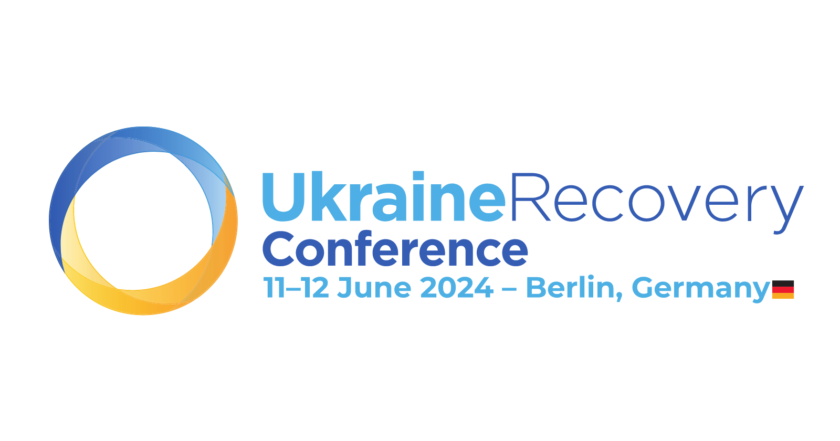Berlin conference to drive Ukraine's recovery and European integration

In February this year, Ukraine's then Deputy Prime Minister for Reconstruction, Oleksandr Kubrakov, met representatives of the German government to discuss the importance of the Ukraine Recovery Conference. In the meeting, he stressed that it should "remain a practical platform for developing cooperation between governments and businesses." He also added that Ukraine has shown progress in many sectors and has the potential to make a stronger statement.
A few months later, Kubrakov was dismissed from office and no longer responsible for the country's reconstruction. While his resignation was a rather turbulent event in domestic politics, it was too ordinary to impact rebuilding efforts directly. Meanwhile, a few weeks have passed, and there is still no new government official in charge of Ukraine's recovery. This is causing concern, which will either fade or intensify in a few days.
On June 11–12, Berlin will host the Ukraine Recovery Conference (URC2024), a joint German-Ukrainian event that will "bring together leaders from governments, international organizations, business and civil society." This annual event will be the third high-level gathering (following the ones in Lugano and London) dedicated to Ukraine's rapid recovery and long-term reconstruction following Russia's full-scale aggression.
The organizers emphasize that this conference is the first to be hosted by an EU member state. Quoting the announcement, URC2024 will also showcase Ukraine's progress in internal transformations, particularly in economic resilience and future EU membership. Of course, this is part of the promotion that couldn't have been composed otherwise, but it highlights an important point — Ukraine is not just playing the role of a supplicant. Mentioning EU membership also doesn't turn the event into a test of capability; it's more about Ukraine's overall European prospects than the current or future reconstruction.
Germany's special envoy for Ukraine and head of the Conference Working Group within the German Foreign Ministry, Jean-Pierre Froehly, called URC2024 "a strong political signal of solidarity with Ukraine from the international coalition" and stressed the importance of viewing Ukraine's reconstruction "in light of its EU trajectory." In short, the event will be extraordinary and crucial for Ukraine's survival.
Against this backdrop, the situation was becoming rather unappealing — the composition of the Ukrainian delegation remained unknown for too long. Despite the conference's proximity, the lack of this information suggested that it was not finalized; otherwise, there would be no reason to maintain this veil of secrecy. Ultimately, the announcement of another event slightly lifted this veil. On June 10, just before URC2024, a conference titled "Resilient, Renewed, Prosperous: Prospects for the Ukrainian Economy" will take place in Berlin. It is expected to include representatives from the European Commission, the German and Ukrainian governments, international financial institutions, as well as academic and expert communities.
The official Ukrainian delegation will include Finance Minister Serhii Marchenko, Deputy Ministers of Economy Oleksii Soboliev, Volodymyr Kuzio, and Tetiana Berezhna, who will discuss issues of state investments, the balance between wartime and post-war economy, and other current matters. The conference will also feature a public discussion on "Restoring Ukraine in the European Context," where the war-battered country will be represented by First Deputy Prime Minister and Minister of Economy Yulia Svyrydenko.
Nothing stops the deputy prime minister from speaking at both events — one hosted by the Kyiv School of Economics and the leading conference — to represent Ukraine at a high level. But is it enough? The currently unspecified "Head of the Ukrainian Delegation" in the event program may be filled by President Zelensky. According to the German newspaper Frankfurter Allgemeine Zeitung, Zelensky is scheduled to deliver a speech in the Bundestag on Tuesday during a specially convened session. The head of the German-Ukrainian parliamentary group, Robin Wagener, called this opportunity "an important sign of our solidarity and friendship with Ukraine and a mark of our respect for the country's achievements."
The conference is taking on more geopolitical significance than expected. While it is approaching, Russia has held its St. Petersburg International Economic Forum. Despite involving the Taliban, some of the world's poorest countries, odious Russian political scientist Karaganov, and Putin's unfunny jokes, they concluded that "Russia is on par with Germany and Japan." While the Ukrainian event will already look like a response, the comparison here is far-fetched, and we should ignore the Russians, who will undoubtedly exploit this situation for maximum propaganda — especially if the Berlin conference fails. There's no indication of such a result. Still, Russians are prepared — the mere possibility of the Ukrainian president speaking in the German parliament is already being portrayed by Kremlin propaganda as "the usurper begging for money to continue stealing."
Why is the Ukraine Recovery Conference happening?
The main goal of URC2024 is to consolidate sustainable international support for Ukraine's recovery, rebuilding, reform, and modernization. However, its organization sparks another round of public debate on "what recovery without victory" means. Both sides of this argument present solid and convincing points but revolve around somewhat illusory ideas.
First, the notion of "victory first, then rebuilding" lacks a time frame and would cause a system that can already function to stall. Losing time under challenging periods is a luxury. Second, a classic 1945-style capitulation of Russia may be an unattainable goal, so linking Ukraine's reconstruction to Russia's willingness to fight to the end (which allows for wide-ranging assessments but resists linear prediction) is also not applicable. Third, recovery should be seen not as a consequence but as a precondition (or even a guarantee) of victory — power plants, gas systems, ports, bridges, and other infrastructure are crucial for both peacetime and wartime economies. Lastly, international partners agreed on the "start now" formula (recovering and modernizing Ukraine without waiting for a victorious end to the war) even before the London event.
Regarding energy, Ukraine's need to attract investments doesn't require any proof. The blackouts and rolling outages where Ukrainians would receive electricity for only a few hours a day due to Russia's destruction of power generation facilities speak louder than any discussions or arguments. However, this urgent problem requires long-term solutions and programs since Soviet-era energy "monuments" were built over many years and will take as long to restore. Alternatively, energy decentralization might prevail, replacing dozens of large generators destroyed by Russia with hundreds of smaller ones. Without foreign investment, we won't see the light at the end of the tunnel.
A few days ago, warnings emerged that Ukraine is approaching the conference irresponsibly despite its importance to the country. The absence of a deputy prime minister for recovery heightens the risk of arriving in Berlin with an incomplete delegation, raising questions and suspicions. The main argument against the worst-case scenario is the close attention from civil society.
If the conference is viewed as a tool to ensure the guaranteed involvement and use of funding for Ukraine's recovery, then the participation of civil society organizations is necessary. It is vital not only because civil society has proven its strength over the past ten years. Just as it successfully acts as a platform for reconciling politics and business interests at home, it is indispensable when the parties involved hold different passports. Their participation is even more relevant considering Ukraine's "corruption hydra," frequently mentioned by global politicians both appropriately and inappropriately. In other words, civil society is meant to guarantee the trust of international partners.
In previous years, a pre-conference confirmed the role of civil society, with Western politicians emphasizing its importance in the country's recovery. The strength of civil society is still evident this year. In preparation for the Berlin conference, the International Renaissance Foundation and civil society experts formulated their proposals for the civil agenda in economic resilience, environmental sustainability, human dimensions of resilience and community recovery, and preparing Ukraine for EU membership. Among other things, experts point to the persistence of the phrase "recovery and reconstruction," which implies restoring not only material losses but also democratic mechanisms. In this context, if research suggests restoring competitive selection for civil service jobs, broader discussions point to the incompleteness of entire institutions.
Circling back to the dismissal of Kubrakov — without a long-awaited replacement, the decision to fire the minister seems like sabotage. It implies that the seriousness of Ukraine's approach to recovery without a deputy prime minister in charge raises eyebrows and doubts, mainly about why political expediency can be a reason for dismissal, but appointments based on the same principle are not happening. What is difficult to argue with can be debated.
The government delegation is more robust than it is perceived. Leaders of the financial and economic sectors and ministers of social policy and foreign affairs are complemented by Ukraine's Acting Minister for Communities, Territories, and Infrastructure Development, Vasyl Shkurakov. Yes, the minister's job title has no official "recovery" part. Still, he has a whole team in the infrastructure ministry handling the function — of course, if the arguments don't boil down to the fact that Kubrakov was dismissed at the wrong time or in the wrong way. Like it or not, this page has already been turned.
Ukraine's recovery is long and costly, regardless of when it starts and how intensely it proceeds. From a physical process standpoint, it's like a "non-Newtonian fluid" that changes viscosity depending on speed, influenced, in our case, by two factors: Russian strikes and Western money. Ukraine is working on both, but its ability to influence each significantly differs. Meanwhile, Russia continues to destroy Ukrainian infrastructure, constantly raising the cost of its reconstruction. Last year, the London Conference raised around $60 billion for Ukraine's recovery. In mid-February this year, the World Bank estimated its cost at $486 billion. The trend is clear: the price of waiting will grow, so there's no time to waste. It's time to act.

















































